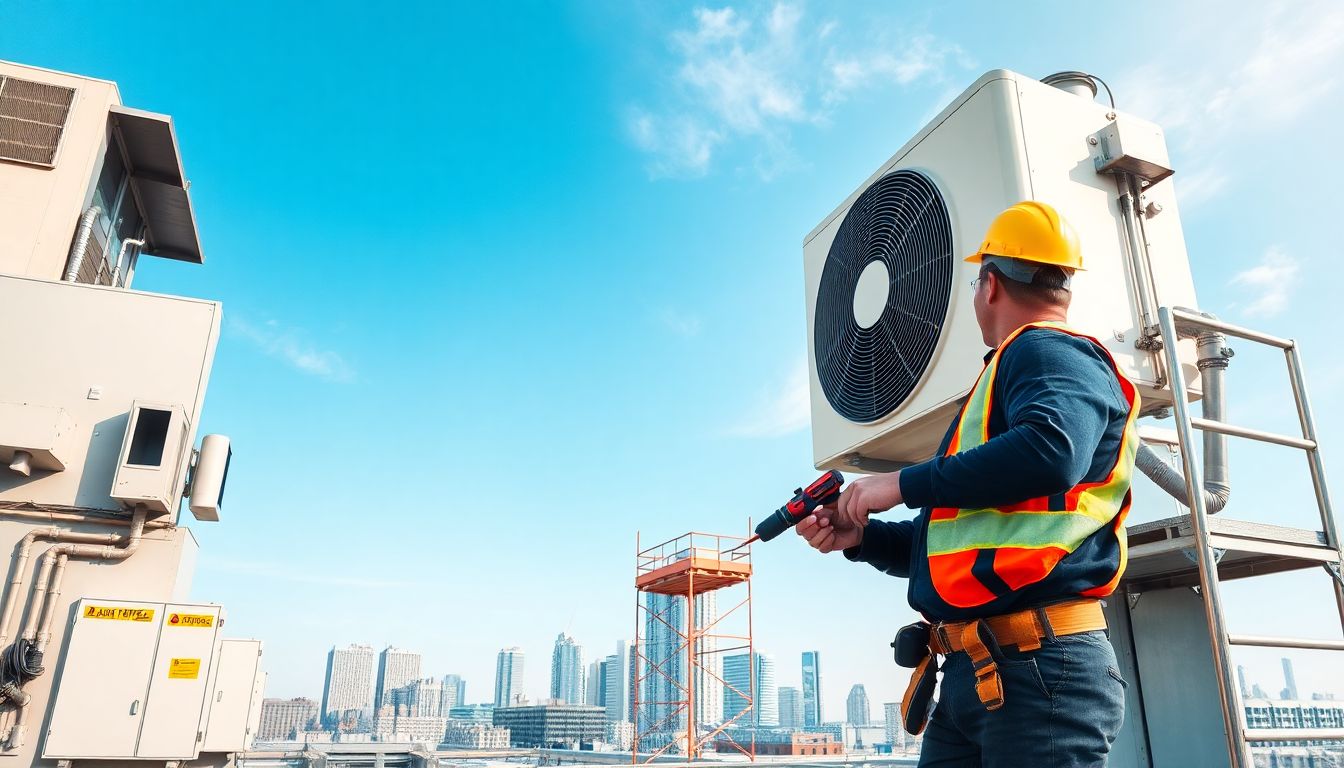Revealing Key Considerations
Introduction
An efficient heating, ventilation, and air conditioning (HVAC) system keeps commercial buildings comfortable, safe, and energy-efficient. Installing an entire HVAC system is far more complex than setting up a window unit at home. It requires expertise and experience that most business owners simply don’t have. Making the right call for professional installation can save you time, money, and future headaches. Here’s what you need to know.
The Sophistication of Commercial HVAC Systems and Why Expertise Counts
Learning About Commercial HVAC Systems
Commercial HVAC systems come in many types, including split systems, packaged units, and VRF/VRV systems. These systems are larger and more complex than residential units, with components designed to handle multiple zones and larger capacities. For example, VRF systems must be installed with precision to function effectively across zones.
Technical Expertise and Code Compliance
Proper installation demands technical knowledge. Professionals understand how to safely install ductwork, electrical wiring, and refrigerant lines. They also ensure compliance with local building codes and safety regulations, which helps prevent legal and safety issues down the road.
Safety Factors
Improper installation can result in serious safety hazards, including electrical fires, refrigerant leaks, and structural failures. Professional HVAC technicians are trained to handle these risks and ensure the system is safely secured and functioning.
Considerations in Making a Decision on Whether to Have a Professional
System Size and Complexity
Large systems must be properly sized for the building. An oversized or undersized system can lead to inefficiencies and reduced lifespan. DIY installation may seem cost-effective, but mistakes often lead to expensive repairs. Professionals get it right the first time.
Building Specifications and Contractor Requirements
Each building has unique characteristics. Older buildings may require custom retrofits, and specialized layouts may demand tailored ductwork. Only certified contractors have the experience and tools to adapt HVAC systems to specific building needs.
Budget and Long-term Cost Implications
Choosing a cheaper installer might seem like a savings at first, but poor installation leads to high utility bills and frequent repairs. A professional ensures energy optimization and long-term efficiency, offering a better return on investment.
Timeframe and Project Scope
Licensed professionals work efficiently, minimizing disruption to business operations. Whether you’re doing a full retrofit or a brand-new build, experienced teams plan the project to meet deadlines and avoid costly delays.
Benefits of Hiring a Licensed HVAC Installer
Quality and Longevity of Installation
Certified technicians install systems with precision, ensuring that equipment functions reliably and lasts longer. This extends the value of your investment.
Energy Efficiency and Cost Savings
A properly installed system uses less energy and maintains consistent temperatures. Over time, these savings can significantly reduce operating costs.
Compliance and Warranty Protection
Most HVAC manufacturers require professional installation to maintain warranty coverage. Licensed contractors also help you meet legal compliance requirements, avoiding fines or penalties.
Post-Installation Support and Maintenance
Reputable contractors offer follow-up services like maintenance and repairs. They provide reliable support and expert advice for future upgrades or issues.
Risks and Drawbacks of Installing HVAC Systems Without Professional Assistance
Incorrect Installation and System Failure
DIY errors often result in system inefficiencies or breakdowns. Fixing these issues later can be expensive and time-consuming.
Warranty Voiding and Legal Issues
Most warranties are voided if the system isn’t installed by a licensed professional. Legal issues may also arise from non-compliant installations.
Potential Safety Hazards
Improper installations can lead to fires, toxic leaks, or structural instability. These hazards put people and property at risk.
Higher Long-term Costs
Cutting corners during installation often leads to higher expenses down the road due to inefficiency, breakdowns, or full replacements.
When Might DIY Installation Be Possible, and Why It’s Not Actually a Good Plan
Small-scale or Temporary Systems
Smaller units like portable ACs or window units may be manageable without a professional. However, these are rare exceptions in commercial settings.
When Professional Assistance Is Still Advisable
Even with minor upgrades, it’s smart to consult a pro—especially for anything involving electrical or ductwork. Expert advice can prevent costly errors.
Expert Opinions
Most HVAC professionals agree: commercial systems require professional installation. The risks of doing it yourself are simply too high.
Important Tips for Choosing the Right Commercial HVAC Contractor
Credentials and Certifications
Choose a contractor who is licensed, insured, and certified. These qualifications demonstrate adherence to industry and safety standards.
Experience and Track Record
Look for proven experience. Request references or read customer reviews to ensure reliable performance.
Transparent Quotes and Contract Terms
Ask for detailed, written estimates. Understand the full scope of work, costs, and warranties before agreeing to any service.
Post-installation Support
Select a contractor who offers ongoing maintenance, emergency service, and customer support. Continued care ensures long-term efficiency and reliability.
Conclusion
Installing a commercial HVAC system is a complex task with serious implications. Professional installation ensures performance, safety, and longevity. Skipping expert help can lead to higher costs, hazards, and system failures. When it’s time to upgrade or install a new HVAC system, trust licensed professionals. Their experience delivers comfort, efficiency, and peace of mind for years to come.
Ready to enhance your business facilities? Contact licensed HVAC installers today for a safe, efficient, and long-lasting installation.
